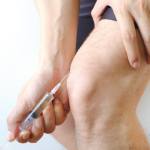For placebo compared with morphine, the VAS pain improvement differences were not statistically significant (P=0.69). However, the VAS pain improvement differences were statistically significant for triamcinolone compared with placebo (P=0.013) and triamcinolone compared with morphine (P=0.006).
No serious adverse events were documented. However, many mild adverse events (n=45) were reported during the study, but not defined in the paper.
In this seven-day, clinical trial, intra-articular morphine was inferior to intra-articular triamcinolone for achieving short-term relief from chronic knee pain in patients with OA and inflammatory arthritis. Also, the single, intra-articular 3 mg dose of morphine did not lead to significant improvements in pain reduction compared with patients who received an intra-articular injection of placebo. The results of this small, short-term study do not support using intra-articular morphine for pain reduction in patients with chronic knee arthritis.
Michele B. Kaufman, PharmD, BCGP, is a freelance medical writer based in New York City and a pharmacist at New York Presbyterian Lower Manhattan Hospital.
Reference
- Haibel H, Siper J, Poddubnyy D, et al. Intraarticular morphine in chronic knee-arthritis—results of a randomized placebo-controlled trial [OP0050]. Ann Rheum Dis. 2022: 81(suppl 1):33–34.

